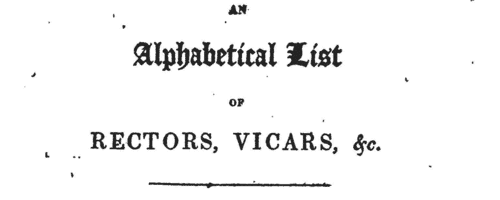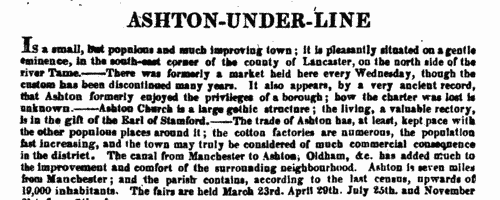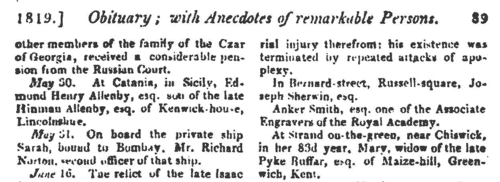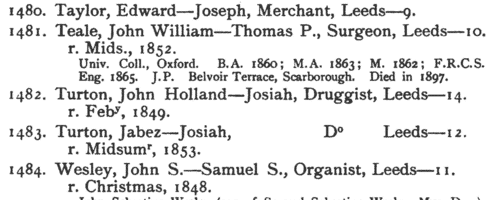Add this eBook to your basket to receive access to all 1,138 records. Our indexes include entries for the spelling whitaker. In the period you have requested, we have the following 1,138 records (displaying 441 to 450): These sample scans are from the original record. You will get scans of the full pages or articles where the surname you searched for has been found. Your web browser may prevent the sample windows from opening; in this case please change your browser settings to allow pop-up windows from this site. Deaths, Marriages, News and Promotions
(1816)
Death notices and obituaries, marriage and birth notices, civil and military promotions, clerical preferments and domestic occurrences, as reported in the Gentleman's Magazine. Mostly from England and Wales, but items from Ireland, Scotland and abroad.
| Sample scan, click to enlarge

| Anglican Clergy
(1817)
The Clerical Guide for 1817 includes this alphabetical list of rectors (R.), vicars (V.) and other Anglican clergy. Names of the king's chaplains-in-ordinary, and of churches and chapels of peculiar or exempt jurisdiction, are printed in italics. The clergy are listed more or less alphabetically by surname, with initial or christian name. | Sample scan, click to enlarge

| Yorkshire West Riding Freeholders
(1817)
A ballot was held at Wakefield 12 to 16 May 1817 for the choice of a new Register (registrar) for the West Riding Registry of Deeds, following the death of J. A. Busfeild esq. The candidates were Francis Hawksworth, esq. (1) and William Lister Fenton Scott esq. (2). 2544 freeholders voted, qualification being male adults in possession of at least £100 per annum. This alphabetical poll book was compiled from the scrutators' and poll clerks' books: it gives full name (surname first) and residence, as well as the situation of the qualifying freehold. Each man's name is preceded by a 1 or 2, indicating for whom his vote was cast. | Sample scan, click to enlarge

| Ashton-under-Lyne Cotton Spinners
(1818)
'The Commercial Directory, for 1818-19-20, Containing the Names, Trades, and Situations of the Merchants, Manufacturers, Tradesmen, &c. in Ashton, Barnsley, Beverley, Bilston, &c. Birmingham, Blackburn, Bolton, Bradford, Burnley, Bury, Chester, Chesterfield, Chorley, Colne, Congleton, Coventry, Derby, Dewsbury, Doncaster, Dudley, Halifax, Heckmondwike, Huddersfield, Hull, Kidderminster, Lancaster, Leeds, Leek, Leicester, Liverpool, Macclesfield, Manchester, Newcastle and the whole of the Potteries, Nottingham, Oldham, Prescot, and St. Helens, Preston, Rochdale, Rotherham, Saddleworth, Selby, Sheffield, Stockport, Stourbridge, Tadcaster, Wakefield, Walsal, Warrington, Wigan, Wolverhampton, Wrexham & York. Together with A List of the London, Country, & Irish Bankers, Tables of the Current Coins of Twenty-eight Countries, With their relative value in British Money. Embellished with a New Map of England and Wales' was published by James Pigot, in Manchester, in 1818. The section for Ashton-under-Lyne is divided into: Attorneys; Auctioneers; Bookseller and Stationer; Boot and Shoe Makers; Cabinet Makers; Calico Printers; Canal Agents; Carriers to Manchester; Cloth Dressers; Clothes Dealers; Coal Merchants; Confectioners; Corn Dealers; Cotton Spinners; Cotton Spinners and Manufacturers; Drapers and Hosiers; Druggists; Fire Insurance Agents; Flour Dealers, Bakers, &c.; Grocers; Hat Manufacturers; Innkeepers; Ironfounders; Ironmongers; Joiners; Linen and Woollen Drapers; Liquor Merchants; Machine Makers; Miscellaneous; Muslin Manufacturers; Plumbers and Glaziers; Reed Makers; Saddlers; Straw Hat and Bonnet Makers; Surgeons; Tallow Chandlers; Taverns and Public Houses; Timber Merchants; Tinplate Workers; Wheelwrights; and Woollen Manufacturers. In most cases full name is given (surname first) and address. | Sample scan, click to enlarge

| Workers at Ewart's Cotton Mill, Manchester
(1818)
The minutes of evidence taken before the Lords Committee on the Cotton Factories Bill include a series of reports by medical men as to the general health of the mill workers in April 1818. For each factory there is a complete list of workers, giving full name, age, how long employed in a factory, health (in general terms, such as 'Good' or 'Sickly'), and any chronic disease or 'distortion', cause and duration - with slight variations from report to report. The physicians examined several hundred people each day, asking such questions as 'Have you any swellings or sores anywhere?', 'Are your limbs straight?', 'Have you a good appetite for food?', 'Do you conceive yourself to be in good health?', and all concluded that the health of the mill workers was good, and that the workers were cheerful. This is the report for Peter Ewart's cotton spinning factory in Manchester, 21 April 1818. | Sample scan, click to enlarge

| Workers at Mitchell, Hardie & Scott's Cotton Mill, Manchester
(1818)
The minutes of evidence taken before the Lords Committee on the Cotton Factories Bill include a series of reports by medical men as to the general health of the mill workers in April 1818. For each factory there is a complete list of workers, giving full name, age, how long employed in a factory, health (in general terms, such as 'Good' or 'Sickly'), and any chronic disease or 'distortion', cause and duration - with slight variations from report to report. The physicians examined several hundred people each day, asking such questions as 'Have you any swellings or sores anywhere?', 'Are your limbs straight?', 'Have you a good appetite for food?', 'Do you conceive yourself to be in good health?', and all concluded that the health of the mill workers was good, and that the workers were cheerful. This is the report for Mitchell, Hardie and Scott's cotton spinning factory in Manchester, 17 April 1818. | Sample scan, click to enlarge

| Workers at Pooley's Cotton Mill, Manchester
(1818)
The minutes of evidence taken before the Lords Committee on the Cotton Factories Bill include a series of reports by medical men as to the general health of the mill workers in April 1818. For each factory there is a complete list of workers, giving full name, age, how long employed in a factory, health (in general terms, such as 'Good' or 'Sickly'), and any chronic disease or 'distortion', cause and duration - with slight variations from report to report. The physicians examined several hundred people each day, asking such questions as 'Have you any swellings or sores anywhere?', 'Are your limbs straight?', 'Have you a good appetite for food?', 'Do you conceive yourself to be in good health?', and all concluded that the health of the mill workers was good, and that the workers were cheerful. This is the report for Messrs John Pooley junior & Co.'s cotton spinning factory in Hulme, 21 April 1818. | Sample scan, click to enlarge

| Deaths, Marriages, News and Promotions
(1819)
Death notices and obituaries, marriage and birth notices, civil and military promotions, clerical preferments, general news and domestic occurrences, as reported in the Gentleman's Magazine. Mostly from England and Wales, but items from Ireland, Scotland and abroad. July to December 1819.
| Sample scan, click to enlarge

| Deaths, Marriages, Bankrupts, Dividends and Patents
(1819-1820)
Death notices and obituaries, marriage and birth notices, bankrupts and dividends, and patents, as reported in the Monthly Magazine or British Register. Includes some marriages and deaths from Ireland, Scotland and abroad.
| Sample scan, click to enlarge

| Boys entering Leeds Grammar School
(1820)
The admission books for Leeds Grammar School from 1820 to 1900 were edited by Edmund Wilson and published in 1906. The series of registers is almost complete for the period, there being in addition admission registers for the Lower (or Commercial) Department from 1856 to 1865, and lists of boys in the school in 1856, and in the Commercial Department in 1861. The entries are arranged by date or term of admission: a sequential number is given first, then surname, christian name, and, after a dash, father's christian name, occupation, and address; another dash, and then the age of the boy at admission, and often his year of leaving (with the abbreviation r. for 'removed' or 'left'). r.* means left without notice; (o) or S. or Stranger or Foreigner indicates a boy not on the foundation. The editor was unable to divine the meaning of the abbreviation (Q) or the asterisks prefixed to most entries in 1856 to 1860, but dutifully copies them into the text. In smaller type he then proceeds, where possible, to add some information about the boy's subsequent career. | Sample scan, click to enlarge

|
Research your ancestry, family history, genealogy and one-name study by direct access to original records and archives indexed by surname.
|











